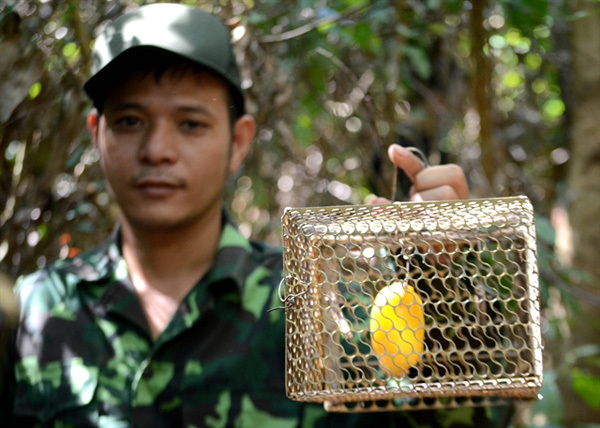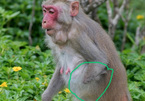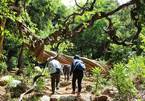 |
|
A forest ranger shows a cage trap found in Son Tra Forest.
|
In recent years, biodiversity conservation work has been implemented by local authorities and residents.
In the first six months this year, forest rangers discovered and seized thousands of animal traps, helping protect wildlife in Son Tra Peninsula.
Trap squad
Every morning, a six-member patrol team made up of forest rangers border guards and the local militia, search for and destroy wild animal traps in Son Tra Forest.
Tran Thanh Dung, the youngest member of the team, said the situation of trapping wildlife in Son Tra Forest had temporarily subsided due to the patrols.
“Common types of traps included drawstrings, nets and cages,” said Dung.
“The most used were drawstring traps because they are simple, compact and easy for carrying and placing in the forest,” he added.
The drawstring trap is made of wire with one end tied to a bent branch and the other end tied to a noose placed under a small pit covered with leaves, according to the forest ranger.
When a wild animal tries to eat some food in the trap, its legs will collapse into the pit, then the noose tightens and the branches will bounce up and hang the ill-fated animal.
The more the animal struggles, the tighter the wire becomes.
The trap was used commonly by illegal hunters as it can catch all animals, regardless of their size and species, Dung said.
Another member of the patrol team, Major Phan Chau Trinh, said some other types of traps were steel cages which locked the animal inside when they come to eat food.
Trapping by nets with baits were also common, Trinh said.
The cages and nets were often used to trap small animals such as civets, ferrets, squirrels and birds.
According to the patrol team, primate species such as golden monkeys, and the red-shanked douc langur were not the targets of hunters because they did not have much economic value and were difficult to trap.
Fines
Along with patrolling and clearing traps every day, the forest rangers also work to find and detain illegal hunters.
Tran Thang, head of the Son Tra and Ngu Hanh Son Forest Ranging Force, said since earlier this year, the patrol team had discovered several illegal hunters in the forest.
In late June, the team caught a hunter while he was placing three traps in the forest.
The man was fined VND500,000 (US$21.5) because he had not yet caught an animal. All his tools were confiscated, Thang said.
In February, a man was caught when placing eight nets for trapping wildlife animals, earning himself a fine of VND750,000 (US$34).
In the first six months this year, the team made 36 patrols discovering and destroying more than 1,300 wire traps, 38 cage traps and eight nets, as well as hammers, pliers, hammocks, nylon sheets, and cooking ware left in the forest by illegal hunters.
Under Decree35/2019/NĐ-CP, those violating forest animal protection regulations can be fined from VND5 million to 400 million (US$215-17,200), depending on the quantity and value of the animals caught.
Shortcomings
However, there are still many difficulties in detecting and handling violations.
First, Son Tra Forest is very large while the patrol team is small so they can't cover all of the forest.
Second, illegal hunters use a lot of tricks to bypass the team. They often ask others to transport them into the forest to avoid using their own vehicles or pretend to be tourists lost in the forest.
There have also been difficulties in evaluating the value of the trapped wild animals to give proper fines.
“Thus, fining was one of the immediate measures. The most important thing is to change people’s awareness of wildlife and environmental protection,” said Thang.
Local authorities of Da Nang City and Son Tra District have run several campaigns to promote wildlife and environmental protection and explain the regulations and punishments relating to forest protection, forest fire-prevention, and sustainable forest management.
While local authorities have worked to improve community awareness of natural protection as a long-term plan, the patrol squad still work hard to find and destroy traps to save animals every day.
For them, each trap cleared is an animal saved.
They do their job with the love for Son Tra, a treasure of Da Nang City. VNS

Large number of traps for hunting wild animals in Da Nang seized
A large number of traps used for hunting wild animals on Son Tra Peninsular have been seized in the central city of Danang.

Sustainable protection needed for Son Tra Reserve
Human activities in the Son Tra Nature Reserve had changed the basic instincts of langurs and monkeys, while threatening the primate population with human-to-wildlife transmitted diseases, according to biologist Tran Huu Vy.
 Son Tra Nature Reserve is known as the “green lung” of Da Nang City with a diverse eco-system and thousands of flora and fauna species.
Son Tra Nature Reserve is known as the “green lung” of Da Nang City with a diverse eco-system and thousands of flora and fauna species.